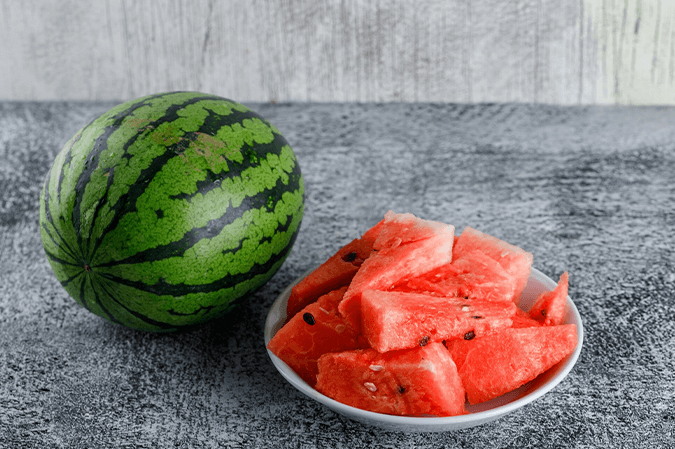Nutritional Value of Watermelon
| Nutrient | Amount |
| Energy | 30 kcal |
| Water | 91.45 g |
| Protein | 0.61 g |
| Total Fat | 0.15 g |
| Carbohydrates | 7.55 g |
| Fiber | 0.4 g |
| Sugars | 6.2 g |
| Calcium | 7 mg |
| Iron | 0.24 mg |
| Magnesium | 10 mg |
| Phosphorus | 11 mg |
| Potassium | 112 mg |
| Sodium | 1 mg |
| Zinc | 0.10 mg |
| Vitamin C | 8.1 mg |
| Thiamin (B1) | 0.033 mg |
| Riboflavin (B2) | 0.021 mg |
| Niacin (B3) | 0.178 mg |
| Vitamin B6 | 0.045 mg |
| Folate (B9) | 3 µg |
| Vitamin A | 569 IU |
| Vitamin E | 0.05 mg |
| Vitamin K | 0.1 µg |
Interesting Facts about Watermelons
- High Water Content: Watermelons are about 92% water, making them one of the most hydrating fruits available.
- Seedless Varieties: While watermelons traditionally contain seeds, there are now seedless varieties that have been bred to meet consumer preferences.
Origin of Watermelon
Watermelons are believed to have originated in the deserts of southern Africa, where they are found growing wild. They were domesticated in northeastern Africa and Egypt around 4,000 years ago and have been cultivated and enjoyed worldwide ever since.
Health Benefits of Watermelons
- Hydration: Due to their high water content, watermelons help keep the body hydrated, especially during hot weather.
- Heart Health: Watermelons contain lycopene, an antioxidant that has been linked to reduced risk of heart disease.
- Skin and Hair Health: The vitamin A and C in watermelons help maintain healthy skin and hair by supporting collagen production and repair.
- Anti-Inflammatory Properties: Watermelons are rich in antioxidants such as lycopene and vitamin C, which help reduce inflammation and oxidative stress.
Specific Benefits for Body Parts or Organs
- Heart: Lycopene in watermelons supports heart health by reducing inflammation and improving circulation.
- Skin: Vitamins A and C contribute to healthy skin by aiding in collagen production and repair.
- Kidneys: The high water content aids in hydration and supports kidney function by helping to flush out toxins.
Sources
- Nutritional values and information about Watermelons were sourced from the USDA National Nutrient Database.
- Information about Watermelon’s origin and health benefits was compiled from various health and nutrition websites, including Healthline and Medical News Today.



